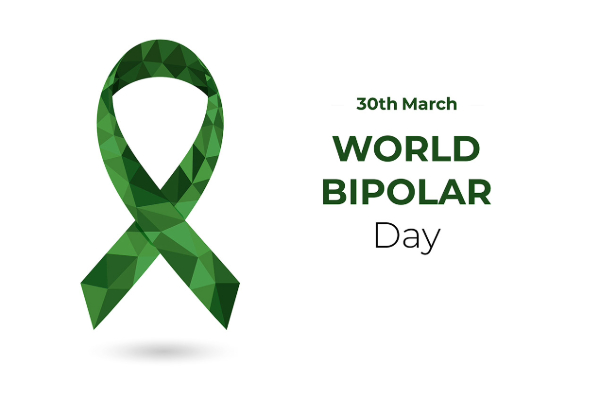On March 30th each year, the world comes together to raise awareness of a mental health disorder that affects nearly 6 million Americans, each in a distinctive way: Bipolar Disorder.

World Bipolar Day
Bipolar disorder (formerly called manic-depressive illness or manic depression) is a mental illness that causes unusual shifts in a person’s mood, energy, activity levels, and concentration. These shifts can make it difficult to carry out day-to-day tasks.
There are three types of bipolar disorder. All three types involve clear changes in mood, energy, and activity levels. These moods range from periods of extremely “up,” elated, irritable, or energized behavior (known as manic episodes) to very “down,” sad, indifferent, or hopeless periods (known as depressive episodes). Less severe manic periods are known as hypomanic episodes.
- Bipolar I disorder is defined by manic episodes that last for at least 7 days (nearly every day for most of the day) or by manic symptoms that are so severe that the person needs immediate medical care. Usually, depressive episodes occur as well, typically lasting at least 2 weeks. Episodes of depression with mixed features (having depressive symptoms and manic symptoms at the same time) are also possible. Experiencing four or more episodes of mania or depression within 1 year is called “rapid cycling.”
- Bipolar II disorder is defined by a pattern of depressive episodes and hypomanic episodes. The hypomanic episodes are less severe than the manic episodes in bipolar I disorder.
- Cyclothymic disorder (also called cyclothymia) is defined by recurring hypomanic and depressive symptoms that are not intense enough or do not last long enough to qualify as hypomanic or depressive episodes.
What are the signs and symptoms of bipolar disorder?
People with bipolar disorder experience periods of unusually intense emotion and changes in sleep patterns and activity levels and engage in behaviors that are out of character for them—often without recognizing their likely harmful or undesirable effects. These distinct periods are called mood episodes. Mood episodes are very different from the person’s usual moods and behaviors. During an episode, the symptoms last every day for most of the day. Episodes may also last for longer periods, such as several days or weeks.
Sometimes people have both manic and depressive symptoms in the same episode, and this is called an episode with mixed features. During an episode with mixed features, people may feel very sad, empty, or hopeless while at the same time feeling extremely energized.
A person may have bipolar disorder even if their symptoms are less extreme. For example, some people with bipolar II disorder experience hypomania, a less severe form of mania. During a hypomanic episode, a person may feel very good, be able to get things done and keep up with day-to-day life. The person may not feel that anything is wrong, but family and friends may recognize changes in mood or activity levels as possible symptoms of bipolar disorder. Without proper treatment, people with hypomania can develop severe mania or depression.
Diagnosis
Receiving the right diagnosis and treatment can help people with bipolar disorder lead healthy and active lives. Talking with your Valley Professionals Community Health care provider is the first step. The healthcare provider can complete a physical exam and other necessary medical tests to rule out other possible causes. The health care provider may then conduct a mental health evaluation or provide a referral to a Behavioral Health provider, who has experience in diagnosing and treating bipolar disorder.
Valley Professionals’ Behavioral Health providers diagnose bipolar disorder based on a person’s symptoms, lifetime history, experiences, and, in some cases, family history. Valley Professionals Community Health Center provides behavioral health services as part of our integrated healthcare model and is easy to access, just talk with your doctor.
By: Becky Robeson, Behavioral Health Provider
Suggested News
Emotional Health
Mental health counseling can benefit people struggling with emotional difficulties, life challenges, and mental health concerns. In therapy, people learn to cope with symptoms that may not respond to treatment right away. Research shows the benefits of therapy last longer than medication alone.
World Mental Health Day
October 10, 2021 is World Mental Health Day. The overall objective of World Mental Health Day is to raise awareness of mental health issues around the world and to mobilize efforts in support of mental health.